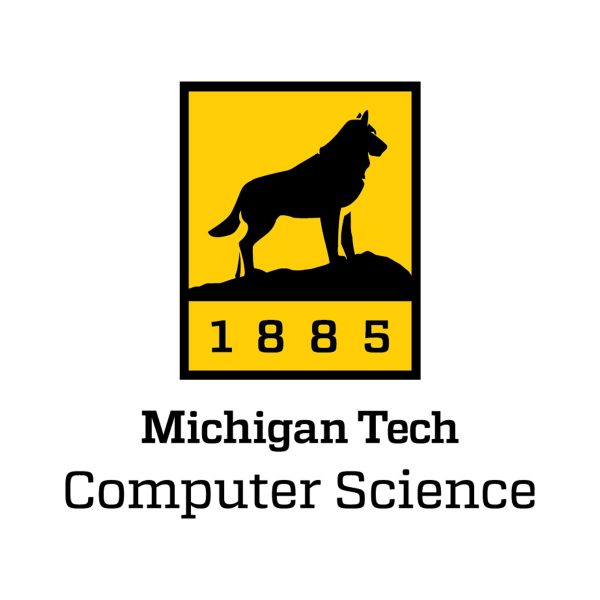
Department of Computer Science faculty and students presented two posters, a paper, and chaired a session at the 26th Annual Conference on Innovation and Technology in Computer Science Education (ITiCSE), conducted online June 26 to July 1, 2021.
“A Visualization for Teaching Integer Coercion,” a poster presented by James Walker with Steven Carr, Ahmed Radwan, Yu-Hsiang Hu, Yu Chin Cheng, Jean Mayo, and Ching-Kuang Shene, was one of three posters that received the conference’s Best Poster Award.
The poster describes the Expression Evaluation (EE) visualization tool. The tool is designed to aid students in understanding type conversions that take place implicitly in C. Understanding type conversions is essential to avoid Integer errors in C which continue to be a source of security vulnerabilities.
An additional paper and poster were presented at the conference, below. Dr. Linda Ott chaired a conference session on Students: Diversity.
Poster: Modeling the Growth and Spread of Infectious Diseases to Teach Computational Thinking by Meara Pellar-Kosbar, Dylan Gaines, Lauren Monroe, Alec Rospierski, Alexander Martin, Ben Vigna, Devin Stewart, Jared Perttunen, Calvin Voss, Robert Pastel and Leo Ureel II
The poster discusses a simulation model developed to teach middle school students about the spread of infectious diseases augmented with affordances to help students develop computational thinking skills. The simulation was partially developed as a Citizen Science project in the courses CS4760 and CS5760, User Interface Design and Human Computer Interaction.
Presentation: Frozen in the Past: When it Comes to Analogy Fears, It’s Time For Us to “Let it Go” by Briana Bettin and Linda Ott
This position paper describes a fundamental difference in attitudes toward the use of analogy in the computer science education community versus other STEM education communities. Additionally, it provides suggestions for how to address concerns in the CS education research community in order to advance research into the use of analogy in computing education
The 26th annual conference on Innovation and Technology in Computer Science Education (ITiCSE) was sponsored by ACM, the ACM Special Interest Group on Computing Education (SIGCSE), the ACM Europe Council, and Informatics Europe.
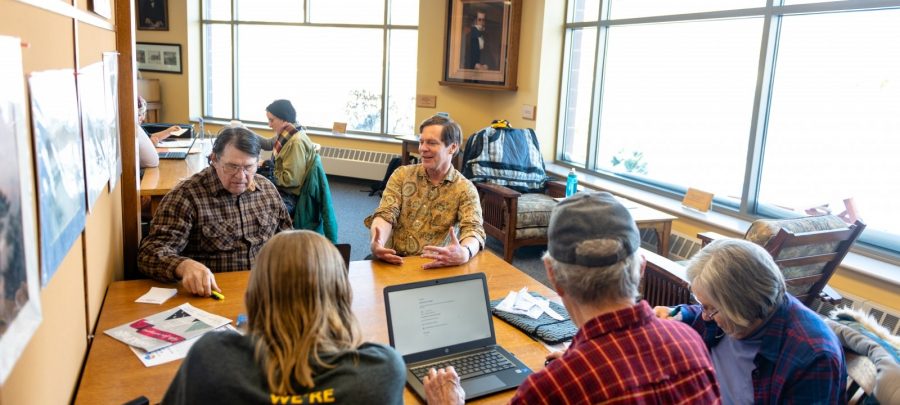
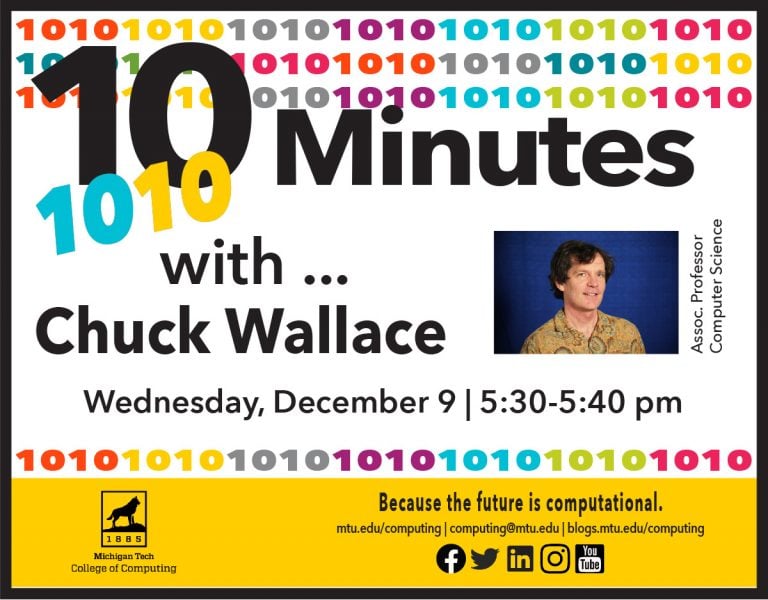
You are invited to spend one-zero-one-zero—that is, 10 minutes—with Dr. Charles Wallace on Wednesday, December 9, from 5:30 to 5:40 p.m.
Wallace is associate dean for curriculum and instruction and associate professor of computer science in the College of Computing at Michigan Tech. Wallace is a researcher with the ICC’s Human-Centered Computing and Computing Education research groups.
In his informal discussion, Dr. Wallace will talk about computing at Michigan Tech, his research on how humans can better understand, build, and use software, and answer your questions.
We look forward to spending 1010 minutes with you!

Next week, on Wednesday, December 15, at 5:30 p.m., Assistant Professor Dr. Nathir Rawashdeh, Applied Computing, will present his current research work, including his use of artificial intelligence for autonomous driving on snow covered roads, and a mobile robot using ultraviolet light to disinfect indoor spaces.
Did you miss 1010 with Chuck Wallace on December 9? Watch the video below.
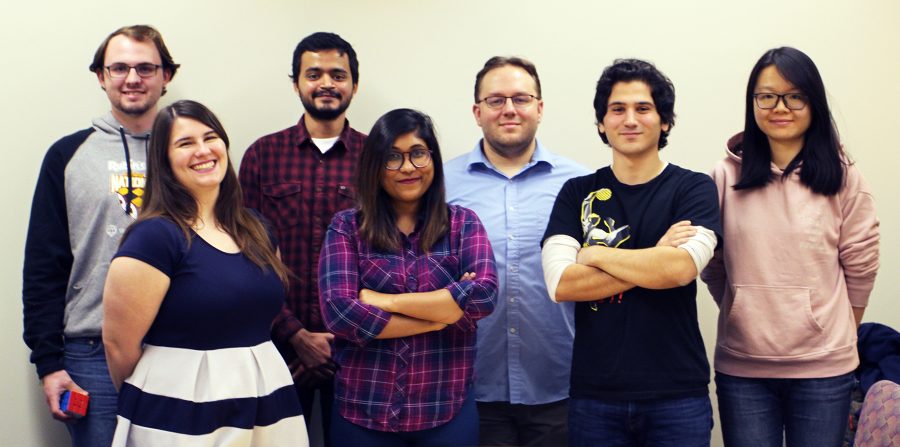
Michigan Tech 2020 Ph.D. graduate Briana Bettin, Computer Science, is among six new faculty members the College of Computing welcomed this fall. Bettin is an assistant professor for the Department of Computer Science and the Cognitive and Learning Sciences department.
This semester, she is teaching courses including CS1121 Introduction to Programming in C/C++, and pursuing research and other projects with faculty and students.
In this, Part II of this profile of Briana Bettin, Bettin and her faculty mentors talk research, education, and novel ideas.
Read the first installment of this article, ‘Briana Bettin, Asst. Prof., Part I: Neopets, HTML, Early Success Part I”, published Oct. 28, 2020, here.
Mental models, constructing knowledge, programming analogies.
Briana Bettin’s research interests are many. They include user experience, human factors, human-computer interactions, mental models, information representation, rural digital literacy, education, engagement, retention, and digital anthropology. Her Ph.D. dissertation aims to better understand how novice programmers approach learning programming, and how their construction of programming ideas might be better facilitated.
“I delve into mental models research and explore theories for how students might construct knowledge,” she explains. “Specifically, the major studies in my dissertation explore how prior applicable knowledge might allow for transfer to programming concepts, which can feel very novel to students who have never programmed before.”
Bettin is also exploring methods for designing programming analogies, testing their application in the classroom, and observing how their use may impact student understanding of specific topics. “I take a very user experience-oriented approach, and work to apply methods and ideas from user-experience research in the CS classroom space,” she says.
Creative energy, insight, and humanity.
With Computer Science department faculty members Associate Professor Charles Wallace and Assistant Professor Leo Ureel, Bettin has worked on projects studying how novice programmers communicate. She and Ureel also worked on several ideas in the introductory CS classrooms, including exploring pair programming obstacles in the classroom and in research.
“I got to know Dr. Wallace during my Ph.D., and I love getting his perspective on research ideas,” Bettin says. “He has so many interesting ideas, and he’s so fun to talk to!”
“Briana brings loads of creative energy, insight, and humanity to everything she does,” says Wallace. “We are very fortunate to have her with us.”
Passionate about Computing Education.
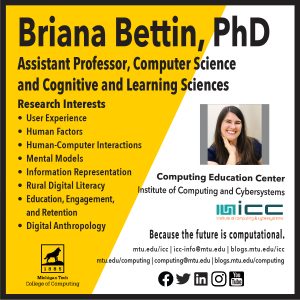
Other research collaborators include Lecturer Nathan Manser, Geological and Mining Engineering and Sciences, and Senior Lecturer Michelle Jarvie-Eggart, Engineering Fundamentals, College of Engineering, with whom Bettin has explored topics in technology acceptance across engineering and computer science.
“Briana has been an enthusiastic addition to our research group,” Jarvie-Eggart says, who is working with Steelman and Wallace on improving engineering students’ acceptance of programming. “She really is amazing!”
Jarvie-Eggart sat in on Bettin’s Intro to Programming class in fall 2019, and noted that Bettin’s. approach of teaching algorithmic thinking and logic—before students begin programming—helps make programming more accessible to all.
“It builds foundational knowledge from the ground up,” she says. “Our research team is very excited about using her progressive CS education approaches to teach engineers programming.”
“Stefka Hristova, in Michigan Tech Humanities, has always been supportive, helping me cultivate an interdisciplinary research vision and voice,” Bettin says. “Dr. Robert Pastel has also been so valuable in helping me approach my research with strong design. He has given me a lot of insight and I am so appreciative!”
“Briana is passionate about Computing Education, and she is invested in infusing equity and diversity into the STEM field,” Hristova says.
In Part III of this article, to be published soon, Briana Bettin talks about peer mentors and friends … and they say a few words, too.
Read the first installment of this article, ‘Briana Bettin, Asst. Prof., Part I: Neopets, HTML, Early Success Part I”, here.
by Michael R. Meyer, Director, William G. Jackson CTL

Assistant Professor Leo Ureel, Computer Science, is among the Deans’ Teaching Showcase members who have been selected to receive 2020 CTL instructional Awards.
The awardees will make presentations next spring semester to share the work that led to their nomination.
When their presentation concludes, each will be formally recognized with a certificate and $750 in additional compensation .
Tuesday, Jan. 26, 2021 — Curriculum Development: Katrina Black, Senior Lecturer in Physics
Thursday Feb. 18, 2021 — Innovative or Out of Class Teaching: Libby Meyer, Lecturer in Visual and Performing Arts and Leo Ureel, Assistant Professor in Computer Science
Tuesday, March 30, 2021 — Large Class Teaching: Kette Thomas, Associate Professor of Diverse Literature in Humanities
These events will take place from 3:30-4:30 on the dates listed. Detailed titles, topics, and registration links for each presentation will be circulated in anticipation of each event.
Many thanks to the previous CTL instructional award recipients and the Provost’s office staff who were instrumental in the selection process.
Please consider suggesting instructors whom you’ve seen make exceptional contributions in Curriculum Development, Assessment, Innovative or Out-of-Class teaching or Large Class Teaching to the appropriate chair or dean so that they can be considered for the upcoming (2021) Deans’ Teaching Showcase during spring semester.